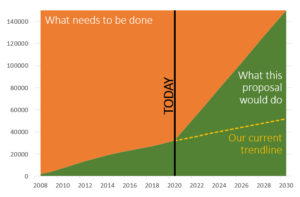|
Total Energy News – February 2021
|
|
|
Your Update on Vermont and National Energy News
|
|
Dear Network Member or Supporter,
In early October 2020, many of you came together for our Annual Network Summit and had the chance to hear fellow Network members give pitches for ideas that would help Vermont rapidly, cost-effectively, and equitably reduce fossil fuel use and greenhouse gas pollution. Of the 10 pitches delivered at the summit, four were selected by our membership to develop Network Action Teams and receive funding and facilitation support from EAN. We wanted to take this moment to share some of the enormous progress being made on these concepts.
Weatherization at Scale: This Network Action Team is focused on the goal of vastly expanding the pace of weatherization for low-to-moderate income Vermonters. Important progress has been made with new partnerships developing, significant inclusion in Governor Scott’s proposed budget, and major focus from the Senate Natural Resources & Energy Committee. More details on the work of this Network Action Team can be seen below in the Member Profile.
Replace Your Ride: A Replace Your Ride program would provide cash incentives to help lower-income Vermonters scrap their older, high-polluting vehicles for a range of clean transportation or shared-mobility options. This group has been learning from successful programs in California, and helping to design a program that would stack with other incentive programs to help low-income Vermonters access lower emission, more reliable transportation options. This program was included in Governor Scott’s proposed budget, is a priority of the House Transportation Committee, and draft legislation is in development.
Future of Rural Transit: This Network Action Team is working towards the overarching goal of preparing Vermont to have the most efficient, equitable, and cost-effective rural transportation system in the US by combining public and school transportation into a single electrified public transportation system. They have been doing outreach to a wide variety of partners including public transit providers, school superintendents and leaders, and regional planning commissions, with the intention of choosing a community where they will conduct a detailed feasibility study this spring and summer. In early fall 2021 a decision will be made about whether there is merit in moving forward to design and seek funding for a pilot of the concept in one or two communities starting in August 2022.
Clean Heat Standard: Building on the success of Renewable Portfolio Standards (RPSs) that have worked well to transform the electricity sector, this Network Action Team is studying the potential for Vermont to create a Clean Heat performance Standard (CHS), applied on a competitively neutral basis to all major suppliers of heating fuels in Vermont. The Clean Heat Standard Network Action Team has been researching topics like the role of different technologies and policy drivers (credit vs allowance systems and how a hybrid approach might work), and how to assure energy equity considerations, consumer protection, and workforce transition support. This research is continuing, most recently through a detailed presentation by the Vermont Fuel Dealers Association, National Biodiesel Board, and National Energy and Fuels Institute.
It has been inspiring to get to watch and support broad groups of Network members working together on these pathbreaking initiatives.
Sincerely,
The EAN Staff Team (Jared, Cara, and Mei)
|
|
|
Data Download – Past and Future Emissions
|
|
|
We are happy to share one of our newest graphs – updated for our upcoming EAN Annual Progress Report. It shows Vermont’s historical greenhouse gas emissions since 1990 and projects the reductions we need make, overall and by sector, to reach Vermont’s Global Warming Solutions Act (GWSA) requirements. These requirements state that Vermont must reduce greenhouse gas pollution to 26% below 2005 levels by 2025, 40% below 1990 levels by 2030 and 80% below 1990 levels by 2050.
|
|
|
How America can rid itself of both carbon and blackouts
Grid and infrastructure failures in Texas show the need for more reliability – and cleaner energy sources.
The Economist
|
|
|
Electric vehicles close to ‘tipping point’ of mass adoption
As battery prices and purchase prices for EVs fall, more than 50% of new cars purchased in Norway are now electric.
The Guardian
|
|
|
Fossil fuel air pollution causes almost 1 in 5 deaths
A new study indicates 18% of total global deaths come from exposure to particulate matter from fossil fuels.
CNN
|
|
|
Member Profile – Weatherization at Scale Network Action Team
What if we could weatherize every home of low-to-moderate income Vermonters who make less than 120% of average median income – including renters – by 2030? This bold vision is motivating the work of a broad EAN Network Action Team that is strategizing, building partnerships, and developing frameworks to make this bold vision a possibility.
|
|
 At EAN’s 2020 Summit in October, Neale Lunderville (VGS) and Ludy Biddle (NeighborWorks of Western Vermont) gave a pitch for “Weatherization at Scale” on behalf of a larger group of EAN members. The pitch was one of 4 that was selected by EAN’s members to receive further support to develop the concept. Since October, rapid progress has been made, including research, modeling, and a significant proposal for increased weatherization funding in Governor’s Scott’s proposed Budget. The partnership of Vermont Housing Finance Agency (VHFA), Efficiency Vermont, Energy Futures Group, and many other Network Members has led to very fast momentum. At EAN’s 2020 Summit in October, Neale Lunderville (VGS) and Ludy Biddle (NeighborWorks of Western Vermont) gave a pitch for “Weatherization at Scale” on behalf of a larger group of EAN members. The pitch was one of 4 that was selected by EAN’s members to receive further support to develop the concept. Since October, rapid progress has been made, including research, modeling, and a significant proposal for increased weatherization funding in Governor’s Scott’s proposed Budget. The partnership of Vermont Housing Finance Agency (VHFA), Efficiency Vermont, Energy Futures Group, and many other Network Members has led to very fast momentum.
Additional Resources:
|
|
|
The Vermont Total Energy Ticker
|
|
|
Federal incentives reduce cost of installing wood heat
A new federal tax credit now covers 26% of the installed price of efficient residential advanced wood heat systems -offering a wide array of benefits for Vermont households.
VT Biz
|
|
|
Charging Forward: Burlington’s Building Effort Hits the Ballot
On town meeting day, Burlington residents will decide if City Council should be allowed to regulate thermal energy systems to reduce GHG by assessing carbon impact or alternative compliance payments.
Seven Days
|
|
|
VT needs to find ways to pay for meeting climate goals
The Act 62 report on All-Fuels Energy Efficiency indicates that more revenue sources are needed for Vermont to meet our emissions targets in the heating and transportation sectors.
Energy News
|
|
|
Have an upcoming event or news story to share? Let us know.
|
|
|
|
|
|






 At EAN’s 2020 Summit in October, Neale Lunderville (VGS) and Ludy Biddle (NeighborWorks of Western Vermont) gave a pitch for “Weatherization at Scale” on behalf of a larger group of EAN members. The pitch was one of 4 that was selected by EAN’s members to receive further support to develop the concept. Since October, rapid progress has been made, including research, modeling, and a significant proposal for increased weatherization funding in Governor’s Scott’s proposed Budget. The partnership of Vermont Housing Finance Agency (VHFA), Efficiency Vermont, Energy Futures Group, and many other Network Members has led to very fast momentum.
At EAN’s 2020 Summit in October, Neale Lunderville (VGS) and Ludy Biddle (NeighborWorks of Western Vermont) gave a pitch for “Weatherization at Scale” on behalf of a larger group of EAN members. The pitch was one of 4 that was selected by EAN’s members to receive further support to develop the concept. Since October, rapid progress has been made, including research, modeling, and a significant proposal for increased weatherization funding in Governor’s Scott’s proposed Budget. The partnership of Vermont Housing Finance Agency (VHFA), Efficiency Vermont, Energy Futures Group, and many other Network Members has led to very fast momentum.

